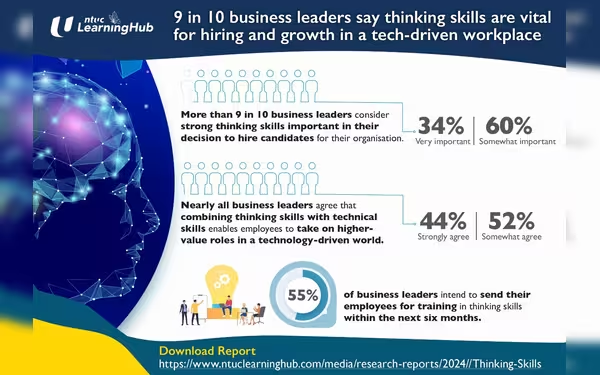Saturday, November 16, 2024 07:56 PM
Business Leaders Stress Importance of Thinking Skills for Growth
- Nine out of ten leaders prioritize thinking skills for hiring.
- Over 80% acknowledge a gap in employees' thinking skills.
- 55% plan to invest in thinking skills training soon.
 Image Credits: prnewswire_apac
Image Credits: prnewswire_apacA report reveals 90% of business leaders find thinking skills essential for hiring and growth in a tech-driven workplace.
In today’s rapidly evolving job market, the significance of thinking skills has become increasingly apparent, especially in a technology-driven workplace. A recent report reveals that a staggering nine out of ten business leaders believe that equipping employees with basic thinking skills is crucial for hiring and growth, regardless of the industry or job role. This highlights a growing recognition that technical skills alone are not enough to thrive in the modern economy.
The findings from NTUC LearningHub's Special Report 2024 on Thinking Skills in a Digital Age indicate that nearly all business leaders agree that combining thinking skills with technical skills allows employees to take on higher-value roles. However, there is a notable gap in thinking skills within organizations, with more than four in five leaders acknowledging this shortfall. Despite this awareness, less than half of the leaders have provided their employees with training in thinking skills over the past year. The challenges they face include a lack of clear metrics to measure progress, inconsistent definitions of effective thinking skills, and difficulties in tailoring training to suit diverse roles.
The report, based on a survey of 200 business leaders, emphasizes the importance of thinking skills in enhancing workers' adaptability and career prospects. It reveals that leaders place equal importance on various thinking skills, such as problem-solving, strategic thinking, critical thinking, analytical thinking, and logical thinking. This suggests that a well-rounded skill set is essential for maximizing human capital in any organization.
Interestingly, despite the challenges, a significant number of business leaders are likely to invest in thinking skills training in the near future. Approximately 55% of them plan to send their employees for such training within the next six months. This proactive approach reflects a growing understanding that thinking skills are vital for navigating career transitions and advancements, especially as technology continues to evolve.
Mr. Amos Tan, Chief Core Skills Officer at NTUC LearningHub, emphasizes the importance of integrating technical expertise with thinking skills. He notes that this combination enables employees to tackle challenges, adapt to changes, and make informed decisions. For instance, strong problem-solving and critical thinking skills allow employees to effectively utilize generative AI systems, ensuring optimal and accurate outputs. This synergy between human intelligence and technology is crucial for guiding decisions that align with an organization’s values and goals.
As the demand for thinking skills continues to grow, so does the skills gap, underscoring the need for comprehensive training programs. By equipping employees with these essential skills, organizations can boost productivity while enhancing individual career resilience. This not only opens up new opportunities for career growth but also ensures that employees remain relevant in an ever-changing job landscape.
The findings from the report serve as a wake-up call for organizations to prioritize thinking skills alongside technical training. As the workplace becomes increasingly complex, fostering a culture of continuous learning and skill development will be key to navigating the challenges of the digital age. Investing in thinking skills is not just a strategic move for organizations; it is also an investment in the future of their workforce.













